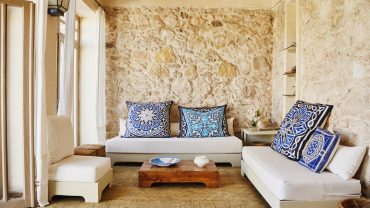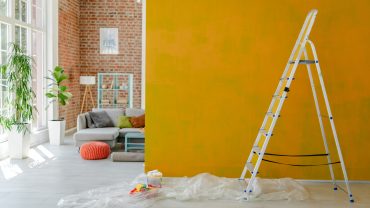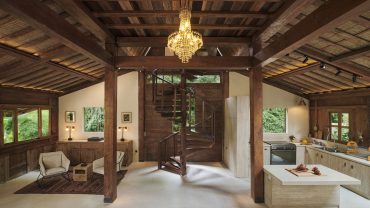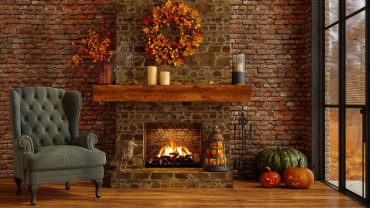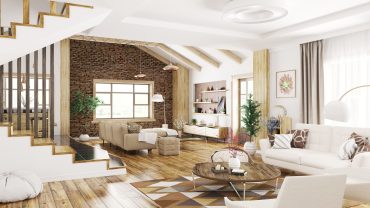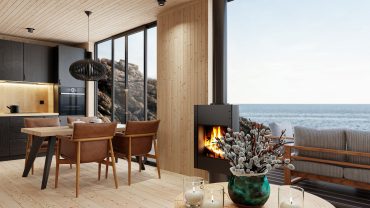The iconic modernist architect Ludwig Mies van der Rohe is often associated with the phrase “less is more.” And in focusing on this idea, he encapsulated the modernist approach to design, with its emphasis on simplicity, clean lines, and a neutral colour palette. Even so, there’s more to the minimalist “lessness” of modern home interiors than these three words imply.
Behind the style and aesthetics is a history and set of principles that come together to create not just a look, but a lifestyle. With plenty of modern interior ideas to demonstrate the point, that’s what we’re exploring in this article. From modern living room design to modern bedroom interior ideas and more, join us as we ask, what is modern interior design?
History and Evolution of Modern Interior Design

Sofa with coffee table by window in living room designed with a modern interior. (Credit: Morsa Images via Getty Images)
The roots of modern interior design trace back to the early 20th century and specifically to the modernist movement. Like many schools of thought, modernism emerged as a rejection of the past. In the aftermath of the Great War, it sought to rethink the world through literature, art, and design. That meant making art affordable, embracing mass production, and reducing costs.
Modernist architecture took the lead, drawing inspiration from the geometric shapes and straightforward simplicity characteristic of Scandinavian design and the Bauhaus school in Germany. Prominent architects such as Mies van der Rohe and Le Corbusier applied these influences to develop housing projects that embodied these principles. A prime example is the Weissenhof Estate in Germany, recognized for its architectural significance and showcasing the work of various contemporary architects. Concurrently, interior design shifted away from the elaborate and lavish elements of Victorian and Gothic styles, embracing a more practical, simple, and minimalist approach.
While some say modernism declined in the 1960’s, modern interior ideas are still pervasive today, often called “mid-century modern.” So, what are its hallmarks?
What is Modern Interior Design?

Modern living room with fire place. (Credit: Michael Robinson via Getty Images)
Some say that modern interior design is more a collection of concepts than a style. Whether or not this is the case, understanding its primary features is an excellent first step towards getting the look.
Blending nature and technology
Modern interior design uses natural materials in their unadulterated state. Whether it’s wood, stone, metal, or fabric, they are unvarnished, unpainted and celebrated for their unadorned aesthetic. These are mixed with new and manufactured materials, as epitomised by designers Charles and Ray Eames’ famous side chair with its wooden base and plastic seat. Bringing the concept up to date, this can mean making the most of advances in, say, sustainable materials.
Minimal Decor
With ‘less is more’ at the heart of modern interior design, its spaces are uncluttered and minimal with clean, simple lines. Every piece of furniture is both aesthetically pleasing and functional, with no unnecessary adornments.
Open spaces
In modern architecture, open plan spaces are a fundamental element. This concept can be integrated into room designs by using furniture to delineate different areas, rather than relying on walls. Think bookcases intersecting living and dining rooms, a corner sofa outlining a TV snug, or a kitchen island distinguishing it from the rest of the living area.
Bringing the outside in
Glass is a major feature in modern home interiors. Not only does it promote openness within interior spaces, but it lets in natural light.
Neutral colours
Serene spaces are at the heart of the modern movement. The emphasis is on creating a harmonious environment that reflects a modern lifestyle while being aesthetically pleasing. In terms of the colour palette, this centres on neutral tones like beige, white and grey, with bold accents for visual interest.
Modern Interior Design versus Contemporary
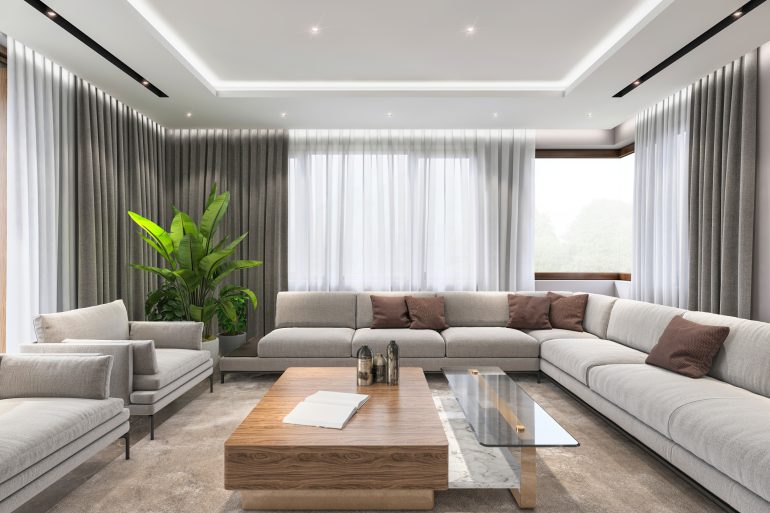
Modern and contemporary luxury living room interior (Credit: ExperienceInteriors via Getty Images)
It should perhaps come as no surprise that contemporary and modern home interior design are so often conflated. First, there’s the purely semantic side, whereby the words “modern” and “contemporary” are potentially synonymous. Then there are the similarities between the two, like their neutral colours and minimal aesthetic. Nevertheless, they are distinct and different. Modern interior design specifically relates to the movement from the early to mid-20th century. Contemporary design refers to the design trends of the present day, which are ever changing. Of course, given that modern design is still popular, the two often coincide.
Implementing Modern Design

Luxurious apartment with modern design, featuring modern furniture. (Credit: mtlapcevic via Getty Images)
There are many ways to incorporate modern interior ideas into a space. Decluttering and opting for furniture with simple, clean lines, and using a neutral palette are just some of the options. Let’s look at how it can be done in specific rooms.
Modern Bedroom Interior Ideas

A bedroom utilising a modern interior. (Credit: alvarez via Getty Images)
Modern bedroom interior ideas often emphasise creating a restful retreat. The colour palette typically involves whites, greys, and beiges. Furniture in a modern bedroom is characterised by its sleek and streamlined design, with low-profile bed frames and built-in storage solutions being popular choices.
Natural light is maximised through large windows or clever lighting solutions, creating an airy and open feel. Textiles, such as bedding and curtains, are selected for their quality and texture, contributing to the room’s overall comfort and aesthetic appeal.
Modern Living Room Design

A living room, featuring modern interior design. (Credit: Westend61 via Getty Images)
Modern living room design focuses on creating a space that’s both stylish and functional, equally usable for relaxation and socialising. Furniture in modern living rooms is characterised by its simple yet elegant design, with pieces like low-slung sofas, sleek coffee tables, and geometric shelving units. Emphasis is placed on quality materials such as leather, glass, and polished metal, adding a touch of sophistication. To enhance the sense of space and light, large windows or strategically placed lighting fixtures are used, highlighting the room’s architectural features. Modern living rooms often incorporate contemporary art or statement pieces, adding personality and visual interest.
Modern Home Interiors

A modern, luxurious living area. (Credit: imaginima via Getty Images)
Modern interior design offers a unique blend of simplicity, elegance, and functionality, making it a popular choice for homeowners and designers alike. Whether you’re renovating a single room or redesigning your entire home, incorporating modern design elements can transform your space into a stylish, contemporary haven. By understanding its history, characteristics, and practical applications, you can successfully implement modern interior ideas into your living spaces, creating environments that are both beautiful and practical.


